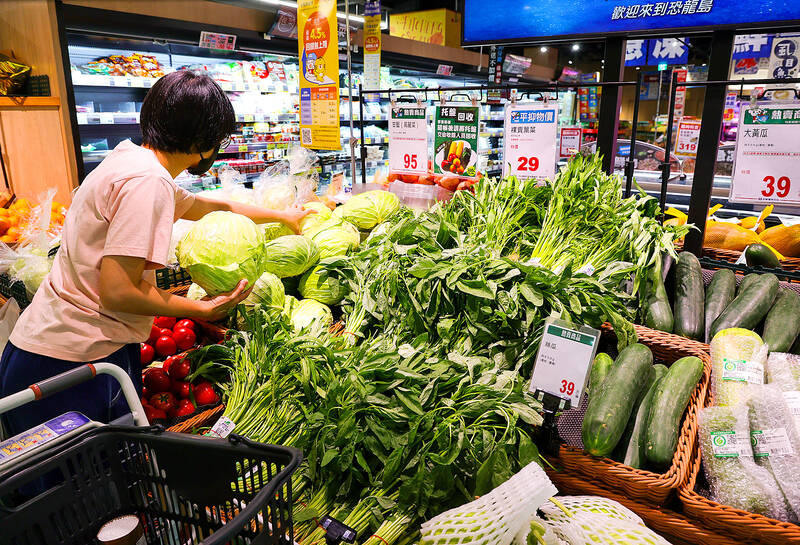The government yesterday offered rare details of its wartime food plan, saying it is taking monthly inventories of crucial supplies such as rice and making sure they are properly stored across the nation in case of a Chinese blockade.
China has over the past five years staged almost daily military activities around Taiwan, including war games that have practiced blockades and attacks on ports.
China’s latest war games around Taiwan, carried out last week, included mock blockades of key ports and areas, and assaults of maritime and ground targets, Beijing said.

Photo: CNA
In a report to the Legislative Yuan about preparations in case of a Chinese blockade, a copy of which was reviewed by Reuters, the Ministry of Agriculture said it has ensured that rice stockpiles were above a three-month level as required by law and that food supplies were stored across the nation in a bid to “lower attack risks.”
Current rice stocks are enough to support the nation for at least seven months and plans on rice rationing through supply stations across the country are being made in case of a food crisis, the ministry said.
During a blockade, more farmland would be used to grow rice, the ministry said, adding that it would prioritize growing sweet potatoes, soybeans and fresh vegetables, as well as using more ponds for aquaculture.
In a scenario in which sea fishing is not allowed, the ministry said the nation’s fish feed inventory would be enough to support fishing in ponds for more than three months.
The ministry said it was planning to set up a task force to ensure food supply safety by taking a monthly inventory of the nation’s food resources.
Taiwan, a farming powerhouse during Japanese colonial rule from 1895 to 1945, depends on imports for the majority of its food needs as farm land was taken over for factories during rapid industrialization starting in the 1960s.
Taiwan’s food self-sufficiency rate last year dropped to an 18-year low of 30.3 percent, a previous report from the ministry said.
In a separate report to the legislature on preparations for the same scenario, the National Security Bureau said China’s cyberforces were honing their skills to infiltrate key online infrastructure such as telecoms in a bid to destabilize Taiwan with misinformation during a conflict with China.
Additionally, over the past two years, China has carried out “joint combat readiness patrols” near Taiwan three to four times per month, it added.
The number of tanker aircraft used for aerial refueling, landing ships and other forces participating in the training has been gradually increased, it said.
“This underscores that the communist military has continued to escalate its military threat against Taiwan in an effort to establish a blockade and control of our external sea lines of communication,” the bureau said.

Several Chinese Nationalist Party (KMT) officials including Chairman Eric Chu (朱立倫) are to be summoned for questioning and then transferred to prosecutors for holding an illegal assembly in Taipei last night, the Taipei Police said today. Chu and two others hosted an illegal assembly and are to be requested to explain their actions, the Taipei City Police Department's Zhongzheng (中正) First Precinct said, referring to a protest held after Huang Lu Chin-ju (黃呂錦茹), KMT Taipei's chapter director, and several other KMT staffers were questioned for alleged signature forgery in recall petitions against Democratic Progressive Party (DPP) legislators. Taipei prosecutors had filed

Taiwan would welcome the return of Honduras as a diplomatic ally if its next president decides to make such a move, Minister of Foreign Affairs Lin Chia-lung (林佳龍) said yesterday. “Of course, we would welcome Honduras if they want to restore diplomatic ties with Taiwan after their elections,” Lin said at a meeting of the legislature’s Foreign Affairs and National Defense Committee, when asked to comment on statements made by two of the three Honduran presidential candidates during the presidential campaign in the Central American country. Taiwan is paying close attention to the region as a whole in the wake of a

NEW WORLD: Taiwan is pursuing innovative approaches to international relations through economics, trade and values-based diplomacy, the foreign minister said Taiwan would implement a “three-chain strategy” that promotes democratic values in response to US tariffs, Minister of Foreign Affairs Lin Chia-lung (林佳龍) said. Taiwan would aim to create a “global democratic value chain,” seek to capitalize on its position within the first island chain and promote a “non-red supply chain,” Lin was quoted as saying in the ministry’s written report to the Legislative Yuan submitted ahead of the legislature’s Foreign Affairs and National Defense Committee meeting slated for today. The Ministry would also uphold a spirit of mutual beneficial collaboration, maintaining close communication and consultations with Washington to show that Taiwan-US cooperation

Taiwan and the US have begun trade negotiations over tariffs imposed by US President Donald Trump earlier this month, Minister of Foreign Affairs Lin Chia-lung (林佳龍) said in an interview this morning before reporting to the Legislative Yuan’s Foreign Affairs and National Defense Committee. The Taipei Economic and Cultural Representative Office (TECRO), Taiwan’s de facto embassy in the US, has already established communication channels with the US Department of State and the US Trade Representative (USTR), and is engaging in intensive consultations, he said. Points of negotiation include tariffs, non-tariff trade barriers and issues related to investment, procurement and export controls, he